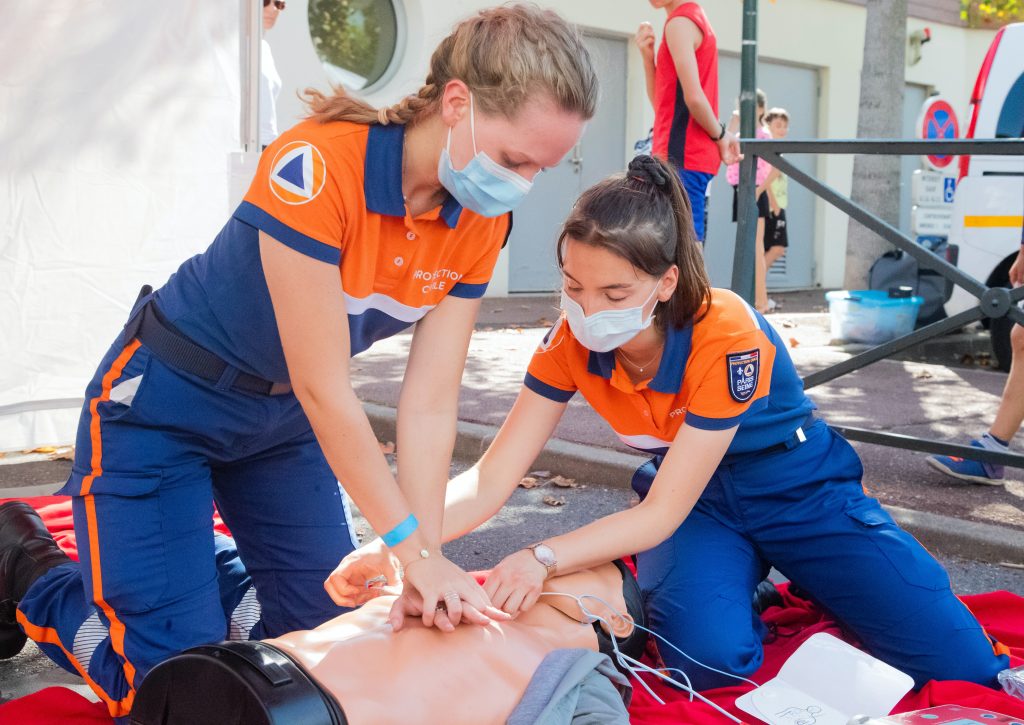Listen to this Blog Post:
As an athletic coach who is coaching middle distance and long distance runners, I am required to undergo CPR training and renew that training every two years.
CardioPulmonary Resuscitation (CPR) is defined as “an emergency procedure consisting of chest compressions often combined with artificial ventilation in an effort to manually preserve intact brain function until further measures are taken to restore spontaneous blood circulation and breathing in a person who is in cardiac arrest.”
CPR is a simple but very effective lifesaving procedure to preserve a person’s brain physically when they are in cardiac arrest.
My CPR training as an athletic coach made me thing about something as a life coach.
As a life coach, is there a simple but effective emergency procedure you can use to “preserve” your brain when you are suffering from an “emotional arrest?”
“Emotional arrest” occurs when you feel overwhelmed or feel you can’t handle a situation and your body typically responds with a “fight or flight” response.
An emotional arrest is an interference with your brain’s regular performance of processing emotional functions causing extreme and immediate panic, anxiety, fear, indecision, etc.
Emotions are defined as “bodily reactions that are activated through neurotransmitters and hormones released by the brain.”
When you are faced with a person, situation or event in your life, you create one or more emotions, based on your current attitudes, beliefs, physical perceptions and from the physical sensations you receive from your 5 senses of the sight, sound, touch, smell and taste.
In many instances a person, situation or event in your life causes you to create one or more emotions that cause you to get overloaded and to go into “emotional arrest.”
The emotions that you create under “emotional arrest” include a complex and interrelated set of behavior patterns and reactions that are likely detrimental to your mental and physical health.
How can you effectively handle any situation in which you are under “emotional arrest?”
Use Emotional CPR. Use this simple and effective Emotional CPR Technique that I have developed.
Immediately become, Calm, Present and Relaxed.
- C – Calm. Use a declaration to initiate a calming reaction for the emotions causing your “emotional arrest.” Say out loud, “I DECLARE, I AM calm.” A “declaration” is a formal or explicit statement or announcement of a state or condition that you know to be true. It is a commitment to a desired result. Then use rhythmic breathing to calm yourself. One type of rhythmic breathing is breathing in, holding, breathing out, pausing and repeating for the same amount of time (e.g., 4-6 seconds). As you breathe, let your thoughts come and go. If you need a visual, picture yourself as a rock in the middle of a stream and your thoughts and your emotions causing the emotional arrest as the water flowing past the rock. Do not try to control or suppress your thoughts. Just let your thoughts come and go as you breathe.
- P – Present. After calming yourself, use a second declaration to put yourself firm in the present moment. Say out load, “I DECLARE, I AM here in the present moment.” Emotional Arrest is typically caused by extreme emotions generated by fear, etc. of past-oriented or future-oriented conditions. The past is gone and the future has not yet occurred. Become very aware of what you are experiencing with your five senses right now in the present moment. Focus on the sensations right now in your body starting at the top of your head and working down to the bottom of your feet without any judgment to determine what you are seeing, hearing, smelling, tasting, and touching. Then change your focus to determine what you are thinking about. Become aware what you are experiencing with your thoughts without judgment with your first sense, your Intuition. Your Intuition is your inner guidance system, that operates on a vibration of truth and love and helps you stay authentic and in integrity. Your Intuition emanates from the energy of a Higher Power and provides you with Divine guidance and Divine intelligence in the present moment and keeps you in the present moment.
- R – Relaxed. When you are 100% in the present moment, use a final declaration to relax yourself. Say out loud, “I DECLARE, I AM relaxed.” Relax your body first by focusing on slowly tightening and relaxing your muscle groups. Start with your head, neck and face muscles and work your way down your body to your toes. While you focus on each muscle group, lightly tense and hold for about 6 seconds and release the tension for about 15 seconds, then repeat. Then relax your mind and trust. Change your mental focus to a peaceful time or event you have previously experienced in your life. Focus on this peaceful time or event for at least 17 seconds. According to Ester Hicks, an inspirational speaker and Hay House author, a minimum of 17 seconds of pure thought about a thought is required to give a thought an energetic “ignition point” and activates a matching energetic vibration within you. Focusing your thoughts on that peaceful time or event for at least 17 seconds will return to you an energetic vibration of peace and leave you in a relaxed mental state as well.
Applying Emotional CPR tecniques when your are facing an emotional arrest condition allow you to create a positive impact into your life.
Out There on the Edge of Everything® …
Stephen Lesavich, PhD
Copyright © 2022, 2024 by Stephen Lesavich, PhD. All rights reserved.
Certified solution-focused life coach and experienced business coach.
![]()








Add comment